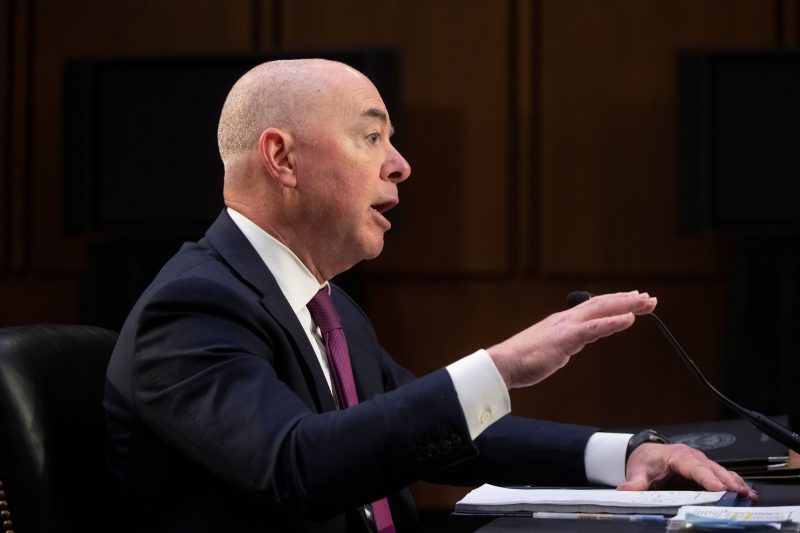
Fentanyl is ‘single greatest challenge’ U.S. faces, DHS secretary says
The record number of Americans dying of fentanyl overdoses is now the “single greatest challenge we face as a country,” Department of Homeland Security Secretary Alejandro Mayorkas told a Senate panel Wednesday.
The statement appeared to be the first time Mayorkas or any other Cabinet-level member of the Biden administration has described the deadly synthetic opioid in those terms. Appearing before a Senate Appropriations subcommittee, Mayorkas cited the deaths of more than 70,000 Americans in 2021 tied to fentanyl overdoses.
Homeland Security officials did not immediately respond to questions about whether Mayorkas has previously described the fentanyl crisis as the country’s greatest challenge. The department includes Customs and Border Protection, the agency responsible for stopping illegal fentanyl and other narcotics from entering the United States.
Sen. Chris Murphy (D-Conn.), the committee chairman, opened the panel’s budget review hearing, telling Mayorkas he wanted the fentanyl problem to be a top priority for the department in 2024.
“This budget better do everything humanly possible to stop the import of deadly fentanyl into the United States,” Murphy said. “This is a red-alert moment.”
Republican lawmakers have blamed the Biden administration’s immigration policies for the increase in fentanyl smuggling and overdose deaths, saying U.S. agents and officers are too distracted by a record level of illegal migration.
Mayorkas told senators that fentanyl was a years-long scourge that has been building, and he said the Biden administration was working with Mexico to “bring the fight to the cartels.”
“We need the funding,” he said. Homeland Security’s 2024 budget proposal includes $305 million for new scanning equipment at border crossings and more than 300 additional agents.
Fentanyl has become the leading cause of death for Americans ages 18 to 49, according to a Washington Post analysis of U.S. government data. The powerful synthetic opioid, 50 times more potent than heroin, has long been used by doctors to treat severe pain or for terminal illness. But since 2015, Mexican drug cartels have been producing and smuggling soaring amounts of fentanyl across the border into the United States, mostly in the form of baby-blue tablets designed to resemble prescription pain pills.
The highly addictive tablets sell on U.S. streets for less than $5 apiece.
“This crap is coming across the border,” said Sen. Jon Tester, (D-Mont.), who said his mostly rural state now has cartel activity and gangland-style shootings. “This is really, really bad.”
Tester urged the Biden administration to consider designating the Mexican traffickers as foreign terrorist organizations “to get rid of these miserable SOBs.” Mayorkas said the line between criminality and terrorism was “a very complicated question” that he would discuss with the senator.
Customs and Border Protection seized nearly 15,000 pounds of fentanyl during fiscal 2022, the highest amount ever, and seizures this year are on track to nearly double. More than 90 percent of the fentanyl stopped by the agency is detected at ports of entry along the Mexican border, the legal crossings where smugglers attempt to conceal fentanyl powder and pills inside vehicles or send it across with pedestrian couriers.
Mayorkas announced a targeted campaign against fentanyl — “Operation Blue Lotus” — during a visit to the Nogales, Ariz., port of entry on March 11. He said the campaign will use sophisticated scanning machines, drug-sniffing dogs and other tools to boost seizures and build criminal cases.
The word “fentanyl” appears 82 times in the department’s 2024 budget documents and other congressional justification briefs from Border Patrol, Immigration and Customs Enforcement and the DHS Science and Technology Directorate, according to a DHS official, up from 28 times in the same documents last year.
